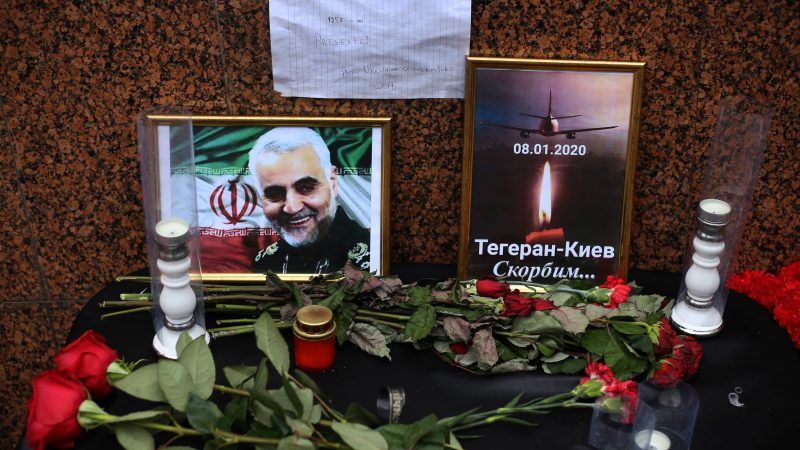If Iran Shot Down the Ukraine Jet, the U.S. Government Deserves a Little Blame
A smart foreign policy includes the consideration of unintended consequences.

Both U.S. and Canadian officials now believe it is likely that Ukraine International Airlines Flight 752, which crashed near Tehran on Wednesday, killing everyone aboard, was shot down by Iranian forces.
Prime Minister Justin Trudeau believes this tragedy may have been unintentional, as it came about in the middle of Iran's mostly ineffective counterattack on U.S. coalition forces in Iraq. It's impossible to state for certain at this point, but it seems possible that during a heightened state of alarm, Iran might have mistakenly believed the plane posed a security threat.
Regardless of why it may have shot down the plane, Iran is primarily responsible for the deaths of those 176 passengers. But it is not absurd to assign the U.S. some responsibility, given that Iran's combat offensive was prompted by the Trump administration's decision to kill Iranian Gen. Qassem Soleimani in a drone strike.
The Trump administration targeted Soleimani because of the man's long, odious history of organizing attacks on American forces, and could not have predicted the specific outcome of a confused enemy lashing out and inadvertently crashing a non-military airplane. But rash decisions prompt unintended consequences, and U.S. officials should have considered the broader mayhem that could result from a sudden escalation in hostilities.
That's why I am surprised to see Indiana Mayor Pete Buttigieg, a candidate for the Democratic presidential nomination, getting so much criticism for this tweet:
Innocent civilians are now dead because they were caught in the middle of an unnecessary and unwanted military tit for tat.
My thoughts are with the families and loved ones of all 176 souls lost aboard this flight. https://t.co/zWaVgWxfdL
— Pete Buttigieg (@PeteButtigieg) January 9, 2020
K.C. Johnson notes that the use of the word "middle" could perhaps be interpreted as suggesting equal blame, and again, there is no equivalence here. But the sentiment is not utterly ridiculous. When sovereign nations attack each other, there are always innocent people who suffer. This is lamentable, and a good reason to avoid war, even if neither side desires or intentionally causes the suffering.
It is especially clear that the Trump administration is not blameless in this case, given the highly dubious manner in which the strike was approved. Trump did not consult Congress until after Soleimani was dead, even though it is Congress, not the president, that possesses the power to declare war. Secretary of State Mike Pompeo's post-facto justification for the drone strike—that an Iranian attack was "imminent"—was utterly unpersuasive to several Republican senators, including Mike Lee (R–Utah), who was offended by the idea that decades' old Congressional authorizations of U.S. military operations in Iraq and against terrorism could be used as a perpetual rubber stamp.
Part of the rationale for allowing Congress to consider, discuss, and debate a decision to go to war is that the people's direct representatives may have novel objections or considerations that do not occur to, or resonate with, the generals and spymasters.
Predictably, some critics of the president are going way too far in other direction:
Every single one of the 176 passengers on the Ukrainian plane that went down was murdered by Donald Trump.
We have to start calling a thing a thing and stop pretending that this man and America are not the biggest terrorists in the world.
— saira rao ???? (@sairasameerarao) January 9, 2020
No, the passengers were not "murdered" by Trump. They were killed, probably on accident, by Iran. Iranian officials did not have to shoot down the plane, or launch a counterattack against U.S. coalition forces. Trump didn't make them do that, nor did he make Soleimani direct terrorists to strike at American forces and their allies.
But yes, the U.S. bears some moral blame for deaths that occur as a result of continuing regional instability fomented partly by American military intervention.


Show Comments (424)